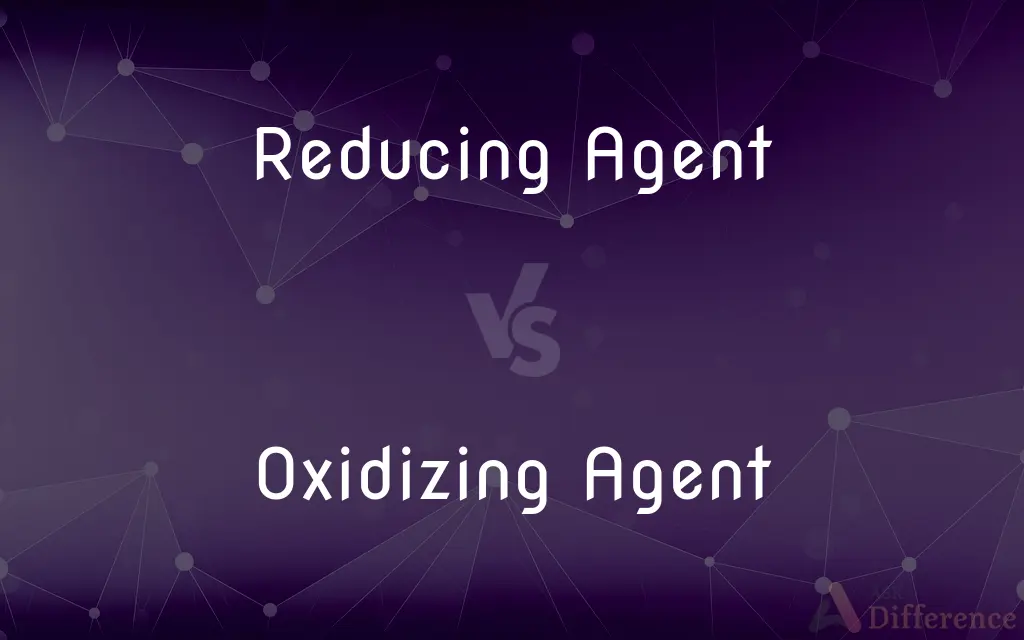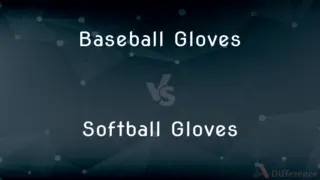Reducing Agent vs. Oxidizing Agent — What's the Difference?
Edited by Tayyaba Rehman — By Fiza Rafique — Published on December 25, 2023
Reducing Agent donates electrons; Oxidizing Agent accepts them. Both play roles in redox reactions.

Difference Between Reducing Agent and Oxidizing Agent
Table of Contents
ADVERTISEMENT
Key Differences
A Reducing Agent and an Oxidizing Agent are essential participants in redox reactions. Both agents are the opposite sides of the same coin, with one losing electrons and the other gaining them.
The role of a Reducing Agent is to lose or donate electrons to another substance. On the contrary, the Oxidizing Agent's purpose is to accept or gain these electrons, leading to its reduction in the process.
It's crucial to recognize that a Reducing Agent gets oxidized during a reaction. In contrast, an Oxidizing Agent gets reduced. These reciprocal actions underline the interconnected nature of their roles.
Oxidation numbers can help in determining the Reducing Agent and the Oxidizing Agent in a chemical reaction. The substance that has an increase in oxidation number is the Reducing Agent, while the one with a decrease in the number is the Oxidizing Agent.
While both Reducing Agents and Oxidizing Agents are involved in electron transfer, their roles are polar opposites, ensuring the completion of the redox reactions that are pivotal in various chemical and biological processes.
ADVERTISEMENT
Comparison Chart
Electron Role
Donates electrons
Accepts electrons
Reaction Outcome
Gets oxidized
Gets reduced
Effect on Oxidation Number
Increases
Decreases
Typical Characteristics
Electron-rich compounds
Electron-poor compounds
Examples
Metals like zinc, iron
Substances like oxygen, chlorine
Compare with Definitions
Reducing Agent
Undergoes oxidation in a redox reaction.
Hydrogen gas acts as a Reducing Agent when it gets oxidized to form water.
Oxidizing Agent
Causes an increase in oxidation state of another substance.
Chlorine is an Oxidizing Agent when it oxidizes sodium to form salt.
Reducing Agent
Substance that donates electrons.
In a reaction, zinc serves as the Reducing Agent by losing electrons.
Oxidizing Agent
Substance that accepts electrons.
Oxygen acts as an Oxidizing Agent when it gains electrons during combustion.
Reducing Agent
Leads to a decrease in oxidation state of another substance.
Carbon monoxide is a Reducing Agent when it reduces iron ore to metallic iron.
Oxidizing Agent
Electron-poor compounds often act as Oxidizing Agents.
Potassium permanganate, being electron-poor, is a strong Oxidizing Agent.
Reducing Agent
Results in an increase in its oxidation number during the reaction.
When sodium reacts with water, it acts as a Reducing Agent and its oxidation number increases.
Oxidizing Agent
Undergoes reduction in a redox reaction.
In a battery, the manganese dioxide is an Oxidizing Agent that gets reduced.
Reducing Agent
Electron-rich compounds often act as Reducing Agents.
Sodium, an electron-rich metal, is a potent Reducing Agent.
Oxidizing Agent
Results in a decrease in its oxidation number during the reaction.
When hydrogen peroxide breaks down, it acts as an Oxidizing Agent and its oxidation number decreases.
Common Curiosities
What role does a Reducing Agent play in redox reactions?
A Reducing Agent donates electrons and undergoes oxidation in redox reactions.
Which agent undergoes reduction in a chemical reaction?
The Oxidizing Agent undergoes reduction.
Are oxygen and chlorine examples of Reducing Agents or Oxidizing Agents?
Oxygen and chlorine are typically examples of Oxidizing Agents.
What happens to the oxidation number of a Reducing Agent during a reaction?
The oxidation number of a Reducing Agent increases during a reaction.
How does an Oxidizing Agent differ from a Reducing Agent?
An Oxidizing Agent accepts electrons and gets reduced, while a Reducing Agent donates electrons and gets oxidized.
In terms of electron flow, how can we define a Reducing Agent?
A Reducing Agent is a substance that donates or loses electrons.
Why is it essential to understand the roles of Reducing Agents and Oxidizing Agents in chemistry?
Understanding these agents is vital for predicting reaction outcomes, balancing equations, and grasping the electron flow in redox reactions.
Can a substance act as both a Reducing Agent and an Oxidizing Agent in different reactions?
Yes, a substance can act as both depending on the reaction and the substances it reacts with.
Is it possible for a single compound to contain both a Reducing Agent and an Oxidizing Agent?
Yes, compounds that can undergo self-oxidation-reduction (disproportionation) reactions contain both agents.
Can water act as an Oxidizing Agent?
Yes, in certain reactions, water can act as an Oxidizing Agent.
What is a common Oxidizing Agent used in laboratories?
Potassium permanganate is a common Oxidizing Agent used in labs.
Which agent is generally more electronegative, the Reducing Agent or the Oxidizing Agent?
The Oxidizing Agent is generally more electronegative as it has a tendency to accept electrons.
Are redox reactions limited to chemistry, or do they occur in biological systems too?
Redox reactions are fundamental in both chemistry and biological systems, like cellular respiration in humans.
Do all metals act as Reducing Agents?
While many metals can act as Reducing Agents, not all do in every circumstance; the reactivity depends on the specific reaction.
Which agent, Reducing or Oxidizing, is involved in the rusting of iron?
Oxygen from the air acts as the Oxidizing Agent in the rusting of iron.
Share Your Discovery

Previous Comparison
Porterhouse vs. Tomahawk
Next Comparison
Baseball Gloves vs. Softball GlovesAuthor Spotlight
Written by
Fiza RafiqueFiza Rafique is a skilled content writer at AskDifference.com, where she meticulously refines and enhances written pieces. Drawing from her vast editorial expertise, Fiza ensures clarity, accuracy, and precision in every article. Passionate about language, she continually seeks to elevate the quality of content for readers worldwide.
Edited by
Tayyaba RehmanTayyaba Rehman is a distinguished writer, currently serving as a primary contributor to askdifference.com. As a researcher in semantics and etymology, Tayyaba's passion for the complexity of languages and their distinctions has found a perfect home on the platform. Tayyaba delves into the intricacies of language, distinguishing between commonly confused words and phrases, thereby providing clarity for readers worldwide.











































